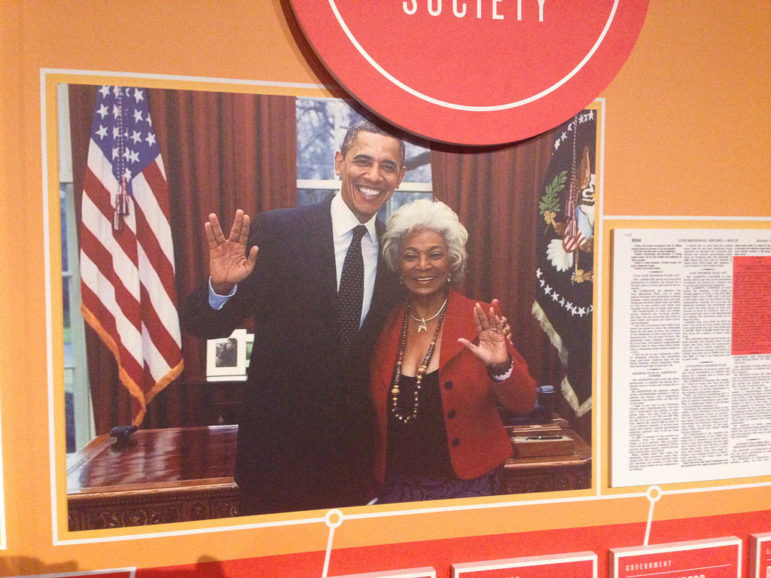
September 8, 2016; Washington Post and ChicagoNow
Gene Roddenberry’s Star Trek celebrated its fiftieth anniversary last week. Amid the current political cycle marked by divisiveness and racial hostility, many are reflecting on how this iconic television series was among the first to reflect diversity and inclusiveness on the screen.
The Washington Post relates the story of how singer and actress Nichelle Nichols inspired Martin Luther King, Jr. in her role as Lt. Nyota Uhura, the Communications Officer on the U.S.S. Enterprise. King, in turn, exhorted Nichols not to leave the television show after its first season to return to the Broadway stage. (Here is Nichols telling this story in a TV Academy Foundation interview).
King sought Nichols out at a Beverly Hills fundraiser and said, “I am your best, greatest fan, and my family are your greatest fans.” When Nichols expressed her wish to join King in his protest marches, he responded, “No, no, no. No, you don’t understand. We don’t need you to march. You are marching. You are reflecting what we are fighting for.” When Nichols shared that she was planning the leave the show, King insisted that she reconsider her decision.
“He said, ‘Don’t you understand what this man [Roddenberry] has achieved? For the first time on television, we will be seen as we should be seen every day, as intelligent, quality, beautiful people who can sing and dance, yes, but who can go into space, who can be lawyers and teachers, who can be professors—who are in this day, yet you don’t see it on television until now.’”
“And at that moment, the world tilted for me,” Nichols recalled.
“And every week, Americans watched a black woman on television. She was not a servant, but a lieutenant, fourth in command of a starship.”
Sign up for our free newsletters
Subscribe to NPQ's newsletters to have our top stories delivered directly to your inbox.
By signing up, you agree to our privacy policy and terms of use, and to receive messages from NPQ and our partners.
By remaining with the franchise owned by CBS and Paramount Pictures, Nichols inspired generations of fans, including President Obama. The two posed together in the Oval Office in 2012, flashing the iconic sign meaning, “Live long and prosper.” Nichols also helped NASA recruit women and people of color.
Gordon Dymowski, writing for the blog ChicagoNow, explains how the following “lessons” artfully conveyed by Star Trek have something to say to nonprofits today:
- Missions matter…and knowing your mission is critical.
- Everyone is capable of both great good and great malice…and professionals learn to how to manage both capacities
- Diversity and inclusion aren’t just phrases—they’re active principles.
- As Captain Kirk said in the episode, “The Ultimate Computer,” “Genius doesn’t come on an assembly line basis—you can’t simply say, ‘Today, I will be brilliant’”
The original Star Trek series was broadcast during the upheaval of the Civil Rights Movement. The Civil Rights Act of 1964 banned discrimination based on race, color, religion, sex, or national origin. This victory ended unequal application of voter registration requirements and racial segregation in schools and at the workplace. Then came the Voting Rights Act of 1965. The Fair Housing Act of 1968 banned discrimination in the sale or rental of housing.
Here is one of many comments to The Washington Post article.
Gene Roddenberry and Star Trek changed my life. When the show premiered, I was a pre-teen girl living in a working class family in a mill town that didn’t even have a library. The show opened my mind to so many possibilities! Could I really be judged on my character and merit, and not on my Appalachian accent and poor clothes? Uhura was great, although I really admired Spock. RIP Leonard Nimoy. Thanks to you, I went to college, graduate and professional school, and have been able, in a small way, to contribute to improving the human condition.
The ideals expressed by Star Trek inspire and inform the world, including civil society. Our work is at its best when we give up ease and security to risk what we think is worth doing. Society is changed for the better when we pit ourselves against inequality and injustice. Everyone is lifted up when a nonprofit gives light and life to an idea that ennobles all who contemplate it. The arts are both an element of and inspiration to civil society; they illuminate the best of our inner lives and enrich the larger world.—James Schaffer













